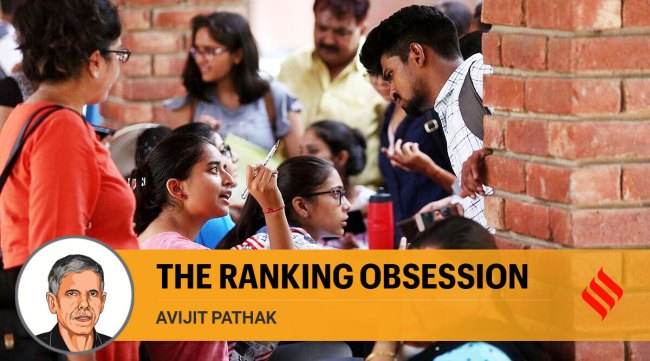Opinion Why our obsession with ranking universities does more harm than good
University rankings harbour a dubious notion about education — everything has to be measured, whatever is immeasurable is insignificant
 A good university need not necessarily be the one that occupies a higher position in the scale of ranking. (Express Photo/File)
A good university need not necessarily be the one that occupies a higher position in the scale of ranking. (Express Photo/File) As a teacher deeply engaged with the ethos and practice of higher education, I feel somewhat disturbed and annoyed by our almost neurotic obsession with the phenomenon of “ranking” and “branding” universities. And, there is no dearth of agencies — from the international agencies like Quacquarelli Symonds (QS) and Times Higher Education World University Rankings to even our own National Institutional Ranking Framework (NIRF) — that are continually declaring the list of “top” universities. No wonder, while these “top” universities celebrate their victories, market their “brand” value, attract young students as consumers, and enhance the “egos” of their celebrity professors, the universities that occupy no significant place in the list suffer from chronic anxiety, and are compelled to feel a sense of “lagging behind”.
For instance, the latest list produced by the QS Asia University Rankings 2023 is likely to produce anguish amongst the upwardly mobile members of the aspiring class in India who are ceaselessly striving for all sorts of “international brands”. They might ask: Why is it that only 19 Indian universities feature in the list, while the universities in China, Singapore or South Korea occupy “top” positions? While they might prefer to send their children abroad, Indian universities will further be stigmatised. For instance, they would speak of the disappointing story of, say, the Jawaharlal Nehru University — filled with the much-abused “tukde tukde gang” — occupying a poor 119th position and they would lament that even the Indian Institute of Science, Bangalore has to remain contented with the 52nd position.
The irony is that because of the preoccupation with the “value-neutral”/“universal” scale of ranking, most of us, including teachers and educationists, will lose the moral courage and pedagogic conviction to problematise this scale, and reimagine the relationship between the university and the world, or life and education. Instead, amid this race in the hyper-competitive era with its characteristic social Darwinism, our universities, instead of working on the deeper function of education, are likely to become more concerned about showcasing their “products” through the mystique of numbers, calculations, tables and other visual devices that continually measure “citations per paper”, “papers per faculty”, “proportion of international students”, “employer reputation”, “faculty-student ratio”, or “international research network”.
In fact, when we accept the supremacy of this mathematics, we tend to give our consent to a highly problematic notion about education: Everything has to be quantified and measured, and whatever is immeasurable is insignificant. To take a simple illustration, while the statisticians can quantify the “papers per faculty”, or the “citations per paper”, they are incapable of understanding whether these papers — even if published in “international” journals — are really contributing to the development of refreshingly new ideas in natural and social sciences, and simultaneously enhancing the moral/ethical conscience of the world tormented by war, militarism, techno-surveillance, hyper-nationalism, racism, climate crisis and heightened social inequality.
Or, is it that in this academic race for publications, citations and international networking, many of our “smart” professors in “branded” universities have mastered the technique of indulging themselves in an otherwise meaningless ritual — continually manufacturing papers, engaging in what Thomas Kuhn would have characterised as mere “puzzle-solving” activities, and managing the cleverly developed circuits of networking for enhancing the citations? Or, for that matter, think of the factor called “employer reputation”. To take a revealing illustration from our country, because of its primary concentration on engineering and techno-science, the placement agencies might reach out to IIT-Bombay. But a university where a significant number of students are enrolled in liberal arts and humanities is unlikely to attract the corporate employers. Does it then suggest that a good doctoral thesis in, say, ancient Indian history, or cultural anthropology is not significant as it does not fascinate the employers, and thereby, help the university to improve its “ranking”? Can these ranking agencies make sense of the ecstasy of deep, rigorous and meaningful teaching — a professor undertaking a journey with his/her students through the curved trajectory of physics and archaeology, or literature and philosophy? Is it that the quality of the learning experience that takes place in silence in vibrant classrooms is insignificant because it is immeasurable?
I feel it is important to redefine the meaning of a good university. A good university need not necessarily be the one that occupies a higher position in the scale of ranking. Instead, a good university ought to equate knowledge with awakened intelligence (not the narcissism of “scholarship”); it should aim at uniting engaged pedagogy and meaningful research (not the fetish of “publications”); it must nurture sensitive and compassionate learners — not merely the workforce for techno-capitalism — who sharpen their academic skills in the process of eradicating social evils like caste, patriarchy, racism and religious bigotry; and it should equate knowledge with wisdom — the wisdom we need to redefine the meaning of research in science, technology, economics and sociology to strive for an egalitarian, ecologically sensitive and spiritually elevated world. Isn’t it paradoxical that despite the presence of so many “top” universities in the world, and the management of showcasing of the glossy list of publications, research projects and citations, the world we live in remains terribly toxic with information pollution, technological violence, religious fundamentalism, hyper-nationalism and threat of yet another devastating war?
Universities all over the world — from the “top ranking” Oxford/Cambridge/Harvard/ MIT to the “low ranking” Indian universities — ought to reflect on this politico-philosophic and pedagogic question.
The writer taught sociology at JNU for three decades




